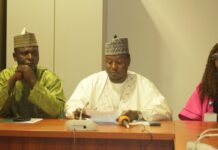The 6th Registrar of Trade Unions’ annual national workshop has commenced in Abuja, Nigeria’s capital.
The workshop is aimed at acquainting participants on the current challenges and Prospects of Trade Union Administration in the country.
In her remarks to participants at the event, the Permanent Secretary, of the Federal Ministry of Labour and Employment, Ms Kachollom Daju, applauded what she called the remarkable response shown by stakeholders in ensuring that they attend this year’s Workshop.
Her words: “it was an indication of their commitment to the shared goal of ensuring a healthy industrial climate in Nigeria.”
She further noted that the promotion of quality professional service delivery in line with international best practices is one of the cardinal mandates of the Ministry of Labour and Employment.
According to the Permanent Secretary, the workshop with the theme “Repositioning the Labour Administration System for Effective Socio-Economic Development in Nigeria, becomes very apt and timely, noting that “effective Labour Administration is key to national development everywhere in the world.”
She said: “Incidentally, this aligns with the policy thrust of the President Bola Tinubu Administration. The essence of this Workshop therefore, amongst others, is to acquaint participants with current trends and contemporary issues affecting Labour Administration in Nigeria, and its implication for sustainable development.
“Furthermore, the Workshop will equip participants with the knowledge, skills, and expertise to efficiently manage trade union affairs, workplace disputes, jurisdictional scope dynamics, and unfair labour practices.
“It will also prepare stakeholders on how to handle the current challenges faced in the world of work, as well as how to harness the opportunities presented by the future of work in Nigeria,” she said.
When the first edition of the Registrar of Trade Unions Workshop was held in 2013, it was agreed that the Workshop would be an annual event, however, the last edition was held in 2019.
The Permanent Secretary said that the resuscitation of the programme was predicated on the determination and commitment of the Ministry to constantly strengthen the Labour Administration System in Nigeria.
“Fundamental thematic Labour Administration concepts and principles such as Social Dialogue, Negotiation, and Collective Bargaining as tools for shaping the Future of Work, improving organizational productivity and workers’ welfare will be discussed.
“Additionally, carefully selected experts in the labour sector will be driving discussions on Innovative and Creative Economic Growth Plans and policies, Trade Union Administration, as well as Adjudication Processes of the National Industrial Court of Nigeria (NICN) concerning Jurisdictional Scope issues.
“These education and empowerment workshops convened annually are essential ingredients for the development of a well-informed workforce which in turn contributes to good governance and the overall reduction in the number of industrial disputes in our workplaces.’’
She urged them as change agents and promoters of productivity enhancement, to ensure that the fundamental objectives of decent work and harmonious industrial relations is achieved. Her words: “it is clear that the fundamental objectives of decent work and harmonious industrial relations cannot be achieved without your contributions as key actors of the labour movement in this great country.”
In an address of welcome, the Director of Trade Union Services and Industrial Relations, Mr. Emmanuel Igbinosun noted that the conference serves as a significant platform for knowledge sharing, critical discussions, and strategic planning as well as provides an invaluable opportunity to delve into the challenges faced by labor administration system in Nigeria and explore the various prospects for its improvement and advancement.
He further stated; “As we gather here today, let us strive to collectively address the pressing issues that hinder our labour sector’s growth and development.
“Nigeria, being a country with a vibrant and dynamic workforce, relies heavily on the effective functioning of its labour administration system. It is our collective responsibility to ensure that our labour laws are enforced, workers’ rights are protected, and a harmonious relationship is fostered between labour, management, and government.”
According to him, only through a robust and efficient labour administration framework can stakeholders tackle the numerous challenges faced by workers and create an environment conducive to sustainable socio-economic growth.
He said: “During this conference, we will have the privilege of listening to insightful presentations from renowned experts and practitioners in the field of labour administration. Topics ranging from strengthening trade unions to addressing informal employment and combating disputes will be examined.
“Together, we will explore strategies, policies, and best practices that can enable us to overcome these challenges and harness the full potential of our labour force”.
The Nigeria Employers Consultative Association, NECA, in its goodwill message called for the appreciation of Nigeria’s data and statistics that underpin the significance of a robust and adaptive labour administration system.
This system, according to NECA, is the bedrock of driving socio-economic growth in the country, especially “during these transformative times.
“The African Development Bank (AfDB) projects a substantial increase of approximately 450 million people in Africa’s working-age population (ages 15-64) between 2020 and 2035.
“This demographic expansion presents an incredible opportunity for economic advancement. However, it also comes with the responsibility to create an environment that fosters gainful employment, promotes inclusivity, and harnesses the potential of our youth.
“While we embrace this opportunity, let us acknowledge the challenges we must address together. The Nigeria Bureau of Statistics (NBS) highlights that the youth unemployment rate in Nigeria will reach 40.6% by the end of 2023.”
NECA stressed that such a pressing issue calls for concerted efforts to equip the youth with the necessary skills, foster entrepreneurship, and create an enabling business ecosystem that supports job creation.
The Nigeria Labour Congress, NLC, in its goodwill message drew the attention of the workshop to the issues of unemployment, and acceptance by employers of the rights of workers to unionise constant dialogue with social partners to ensure industrial harmony in the county.
The Workshop which ends on Thursday, is expected to produce a working document which the Permanent Secretary, Ms Kachollom Daju promised to act on.
END













































